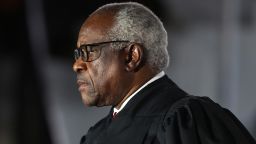The Supreme Court cleared the way on Monday for the House select committee investigating the January 6 US Capitol attack to obtain the phone and text records of Arizona Republican Party Chair Kelli Ward.
Ward served as a fake elector for Donald Trump in Arizona, one of the states the former president lost but where Republicans gathered to put forth a pro-Trump slate of electors.
Ward has argued the subpoena was too intrusive and violated her First Amendment rights, potentially exposing political connections. The committee has also sought Ward’s testimony. She invoked her Fifth Amendment rights during the deposition.
The justices declined Ward’s request to freeze the subpoena and lifted a temporary order earlier put in place Justice Elena Kagan, who supervises the appeals court that ruled in the case.
Justices Clarence Thomas and Samuel Alito would have agreed to block the subpoena, the court said.
The move is the latest dispute concerning January 6 to come before the conservative-leaning court. Last January, the high court cleared the way for the release of presidential records from the Trump White House to the committee. Only Thomas publicly noted a vote in favor of Trump.
The subpoena from the House select committee directs T-Mobile USA, Inc., to release call records from Ward’s phone for the period of November 1, 2020, through January 31, 2021, and only sought times and durations of calls when Ward served as an elector for Trump.
The records do not include content or location information. A district court judge ruled against Ward and the 9th US Circuit Court of Appeals affirmed.
“The subpoena is substantially related to the important government interest in investigating the causes of the January 6 attack and protecting future elections from similar threats,” the appeals court said.
“The investigation, after all, is not about Ward’s politics; it is about her involvement in the events leading up to the January 6 attack, and it seeks to uncover those with whom she communicated in connection with those events,” the appeals court added. “That some of the people with whom Ward communicated may be members of a political party does not establish that the subpoena is likely to reveal ‘sensitive information about [the party’s] members and supporters.”
In the emergency application filed with Kagan, Ward’s attorneys argued the case is “unprecedented” with “profound precedential implications for future congressional investigations and political associational rights under the First Amendment.”
If Ward’s telephone and text messages are disclosed, they added, “congressional investigators are going to contact every person who communicated with her during and immediately after the tumult of the 2020 election.”
In response, lawyers for the select committee articulated they sought the phone records because Ward was at the center of several efforts after the election to undermine the popular vote and “aided a coup attempt.”
“These records will shed light on how Dr. Ward contributed to the multi-part effort to interfere with the peaceful transition of power and the attack on the U.S. Capitol,” the lawyers wrote.
The House noted Ward told officials in Arizona to stop counting ballots after the 2020 election; encouraged local officials to contact Trump’s lawyer Sidney Powell; tried to organize a phone call between Trump and the Maricopa County board of supervisors’ chairman; and she was among the group that sent false electoral votes for Trump to Congress.
In a court filing Monday night, T-Mobile said that it “now intends to fulfill its obligations under the Subpoena by producing to the Committee all responsive records.”
This story has been updated with additional details.
CNN’s Katelyn Polantz contributed to this report.







